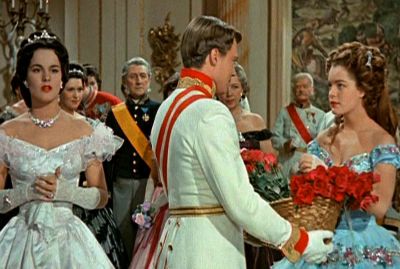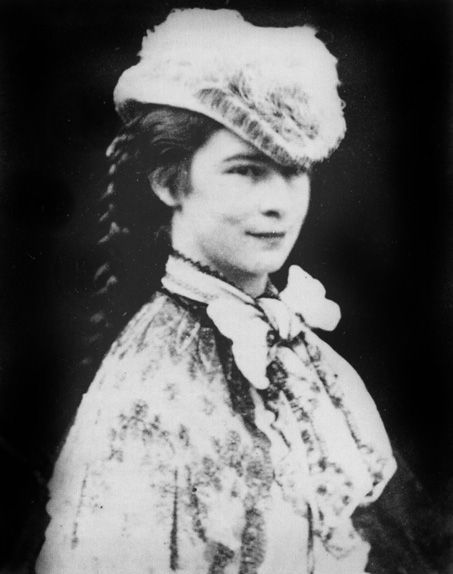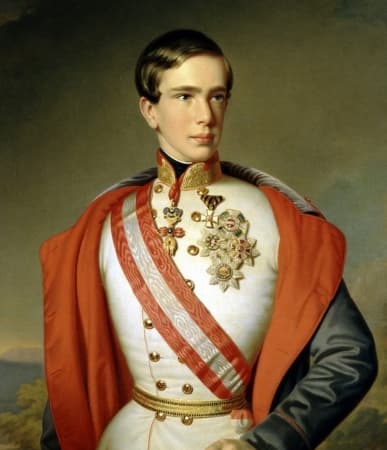The assassination of Empress Elisabeth of Austria
Twenty-five year old Luigi Lucheni must have thought he missed, that morning on September 10th,
1898 on the boardwalk in Geneva. He stabs Empress Elisabeth of Austria, but she
gets up again, picks up her hat and continues her way towards the boat that is
waiting to depart for Montreux.
The assassination of Empress Elisabeth of Austria in Geneva on September 10th, 1898 shocked the whole world.
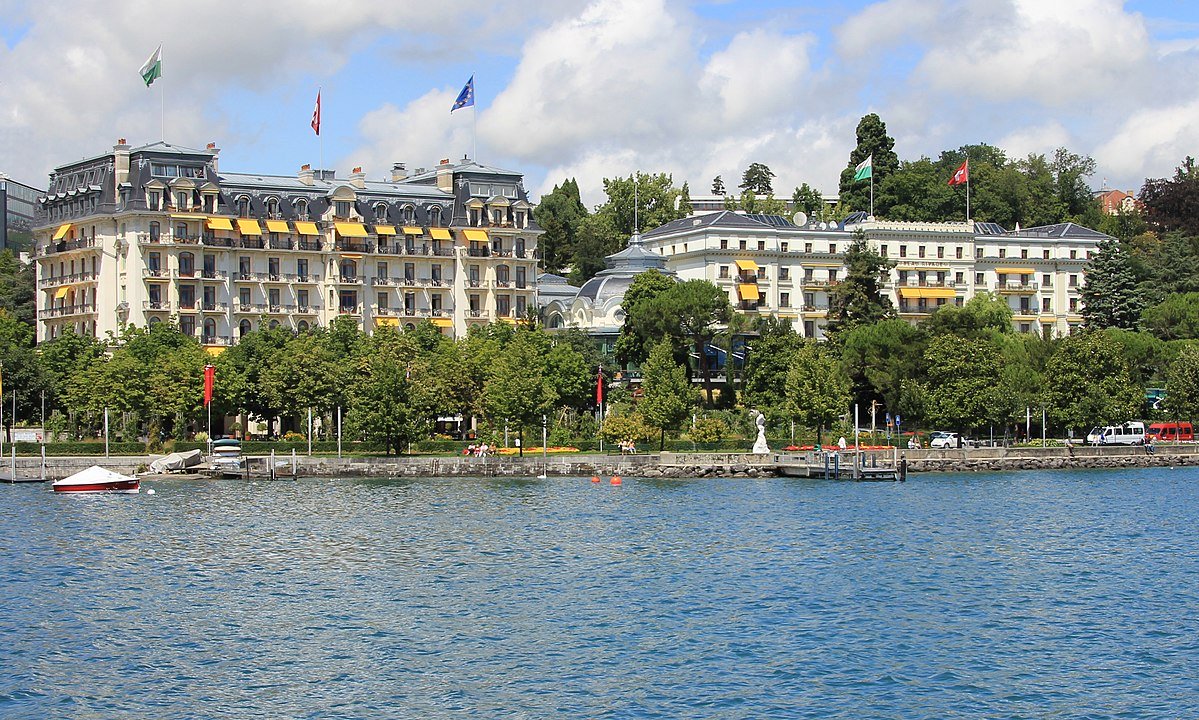 Hotel Beau-Rivage, Geneve
Hotel Beau-Rivage, GeneveDISCLOSURE: I get commissions for purchases made through some of the links in this article.
Why was empress Elisabeth killed?
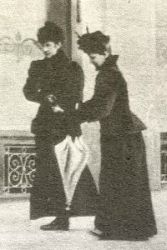 Empress Elisabeth and Countess Irma Sztaray at Territet, Switzerland
Empress Elisabeth and Countess Irma Sztaray at Territet, SwitzerlandItalian from origin, Luigi came to Geneva to kill Philippe, Duke of Orleans, the pretender to the throne of France.
Luigi is an anarchist who believes in 'Propaganda of the deed'. By taking violent action this political position aims to provoke a revolution. Anarchists like Luigi Lucheni believed that all forms of government are inherently oppressive and that the only way to achieve a truly free society is to abolish them altogether. They argued that violence was sometimes necessary to achieve this goal, and they often targeted government officials and other symbols of authority.
As Luigi arrives in Geneva he learns that Phillipe already left for the Valais.
As he is deciding his next move, he reads in the paper that another royal person is staying in Geneva.
A classic case of being in the wrong place at the wrong time; Empress Elisabeth resides in the Hotel Beau-Rivage on the shores of Lake Geneva. She travels incognito under the pseudonym Countess of Hohenems, but a newspaper reveals her true identity and publishes this. Luigi reads it and changes his plans, waited for the right moment to attack. It is not the person that matters to him, just the act of killing a member of the aristocracy is what’s important.
On this sunny Saturday at 1:35 pm the Empress and Countess Sztaray, her lady in waiting leave the hotel. All the other staff in service of Elisabeth has already left Geneva by train, and stubborn as she is, Elisabeth refused to take bodyguards with her.
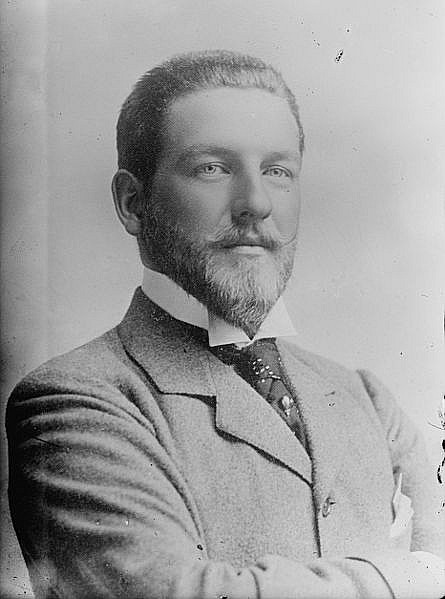 Philippe, Duke of Orléans (1869 - 1926), escaped being assassinated in Geneva. The assassinator was Luigi Lucheni who killed Empress Elisabeth of Austria instead.
Philippe, Duke of Orléans (1869 - 1926), escaped being assassinated in Geneva. The assassinator was Luigi Lucheni who killed Empress Elisabeth of Austria instead.Luigi has been waiting for an opportunity like this. He approached the ladies when they walk by and acts as if he stumbles and falls against Elisabeth, stabbing her with a sharpened needle file. Elisabeths falls down, but is helped up again by a coach driver and she and the countess continue to walk to the gangway and board the ship. Elisabeth even talks to the countess, saying that Luigia perhaps tried to steal her watch. She nor any of the bystanders, realize that she is stabbed.
Sisi dies at the age of 60
Luigi did not miss, his file punctured the body of the empress for 8.5 cm, broke the fourth rib, pierced the lung and penetrated the heart fully. The fact that Elisabeth could get up and walk on is first of all due to the good shape Elisabeth is in. Despite her age Sisi is well trained, as she has been all her life. She grew up in the mountains, loves hiking and horseback riding, never smoked and had no obesity. To keep up her good looks she did gymnastics on a daily basis. This resulted in a very good physical condition for a woman of her age at the end of the 19th century.
The other thing that made her keep her on her feet for so long was the tight corset she wore. Because of the compression of her belly and pelvis there must have been relatively more blood in the upper part of her body than there usually is.
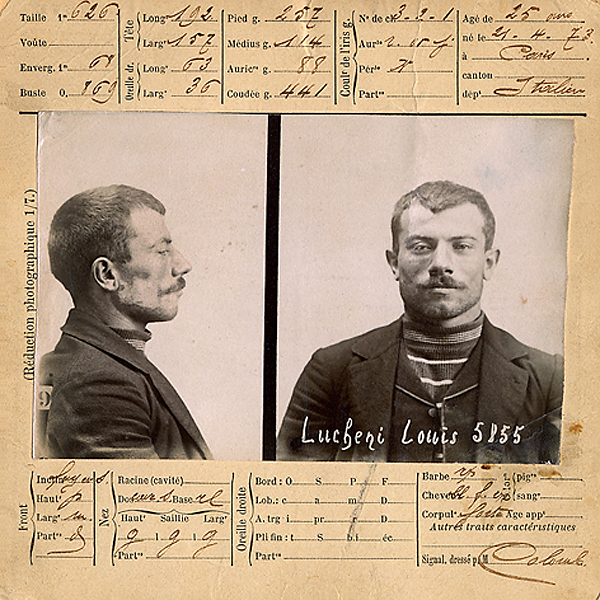 Mugshot of Luigi Lucheni, the killer of Empress Elisabeth (Sisi) of Austria
Mugshot of Luigi Lucheni, the killer of Empress Elisabeth (Sisi) of AustriaEmpress Elisabeth faints for the first time when on board of the ship. She comes to again, probably because the new blood flow that reaches her brain because of her horizontal position as she is now laying down. She asks the countess what has happened, still no clue of her situation.
Only after opening of the corset by the countess, causing the blood reserve to spread over the rest of the body, the empress faints for the second and last time.
Countess Sztaray than sees the small blood stain on Sisi’s breast and raises the alarm. The captain of the boat, Captain Roux, is made aware of the identity of the fainted lady and immediatley turns the boat around towards the landing stage in front of the Hotel Beau-Rivage. A stretcher is improvised from sails and peddles and six boatmen carry the empress back to her hotel room.
Most likely she already dies on board of the boat. Two doctors are in the hotel, but when doctor Golay arrives in her room it is already too late. Heart surgery is not possible yet in 1898 anyway, so the stabbing of the heart would have been fatal, even if it was recognized immediately after the attempt.
To check if the Empress is still alive Dr. Mayer makes a small incision in Sissi's arm, but there is no blood flow, and the Empress is pronounced dead at 2:20, September 10th, 1898. The priest that arrived together with the doctors is too late to grant her absolution.
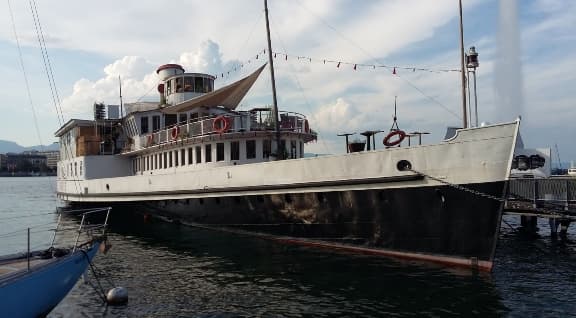 The steamship “Genève”, the boat on which Sisi died, is still afloat in the harbour of Geneva.
The steamship “Genève”, the boat on which Sisi died, is still afloat in the harbour of Geneva.In the meantime, Luiga is on the run, and confused. He is sure he stabbed her, but she got up again. While he fled he threw the bloody file into a portway on the rue des Alpes, where it was found the next day (it is now part of the collections of the SISI museum).
When he is arrested the same day: 'he followed without protest, even sang a song and stated for instance: 'I certainly hit the right place, I must have killed her". You can imagine his triumph when he hears that he is arrested for murder, you can see it in the picture that is taken from this moment.
He is excited to hear that the empress had died, and hopes to get the dead sentence, becoming an immortal martyr of the anarchist movement. However, the death penalty was abolished in Switzerland, and his requests to be extradited to Italy are rejected. He spends the next 10 years in jail, before he managed to hang himself on 19 October 1910. His name is forgotten, while his murder made a legend out of empress Elisabeth.
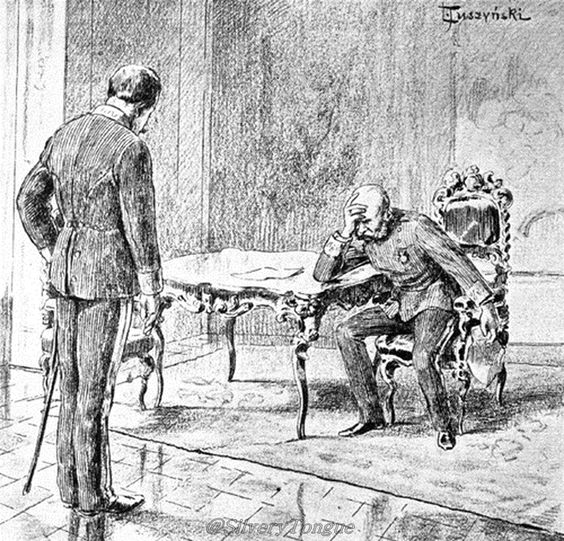 General Count Paar, the Emperors adjudant, deliveres the news to Franz-Joseph, that Empress Elisabeth has died.
General Count Paar, the Emperors adjudant, deliveres the news to Franz-Joseph, that Empress Elisabeth has died.In Vienna the news of the assassination of Empress Elisabeth of Austria got in around six that afternoon. It caused great sorrow and even anti-Italian reprisals.
Franz Joseph is in his study at the Hofburg palace when he receives the telegram. He had often been worried that his melancholic wife would take her own life, and now he thinks the time has come. Only after receiving another, more detailed telegram he understands that she was murdered. He is devastated, and sighs; "mich bleibt doch gar nichts erspar (I am spared nothing in this world).
Elisabeth makes her last journey on Wednesday 14 September, when her body travels from Geneva to Austria by train. There she is buried alongside all the deceased Habsburg royals in The Imperial Crypt beneath the Capuchin Church in Vienna. It is 17 September 1898. She leaves behind a heartbroken husband, her two daughters and a grieving empire and kingdom.
